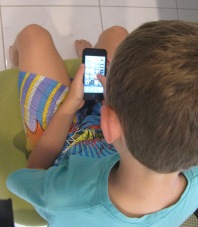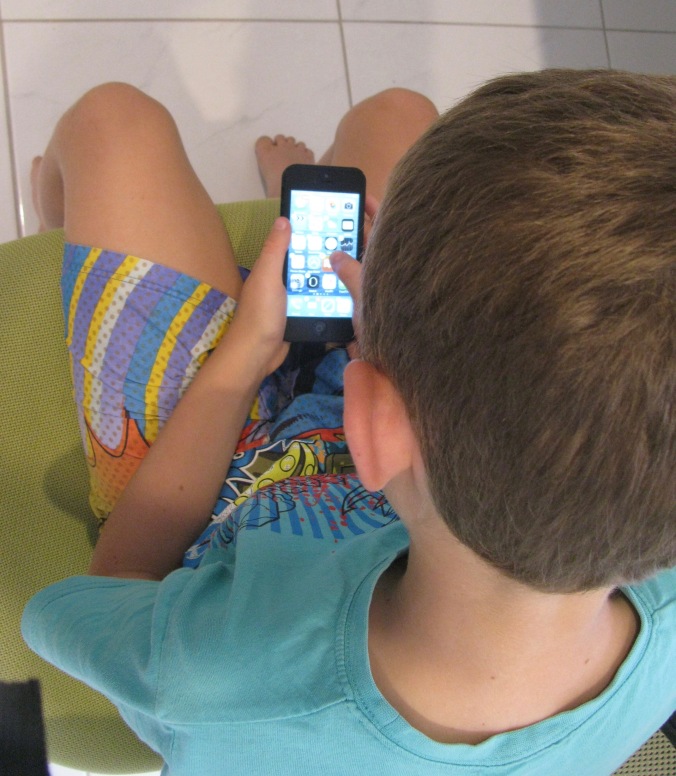First published on Mamamia 31/1/2016
 My son recently came home from school asking to have a look at Instagram. He told me one of his classmates had said he’d put my son’s photo up and he wanted to know if it was true. Neither of us have an account but it’s easy to create one and we quickly found the photo. It appeared innocuous. My son and two of his friends, smiling for the camera, taken after school.
My son recently came home from school asking to have a look at Instagram. He told me one of his classmates had said he’d put my son’s photo up and he wanted to know if it was true. Neither of us have an account but it’s easy to create one and we quickly found the photo. It appeared innocuous. My son and two of his friends, smiling for the camera, taken after school.
BUT – the account was set to ‘public’ meaning anyone can see the pictures. Over a thousand people were following the account. My son was wearing his school uniform. With the logo visible and readable. One of the other boys in the photo had no shirt on at all. I was alarmed. Because – and here’s the unfathomable part – my son is eight years old. The owner of the public Instagram account is seven.
I was flabbergasted. Outraged. Upset. But mostly baffled.
Surely this boy’s mother either did not realise her son’s account was public? Or she did not understand the inherent risks in letting a young boy have unregulated social media accounts? As a police officer, I have seen first-hand how gullibility and inexperience can lead much older and wiser people into the dark and twisty depths of the world-wide-web.
I spoke to some of my colleagues at the police station about it and we agreed this was a matter of education. I grabbed a brochure on cyber safety and approached the boy’s mother at the school gate that afternoon. The conversation I had with her left me more baffled than I began with.
Yes, of course she knew the boy’s account was public. She set it to private, but he changed it back to public. She said it as if that was the end of that. There’s nothing you can do about your seven year old’s social media settings? Really?
Yes, she knew he had over a thousand followers. They’re all just other kids of course, she told me. Are you kidding me? Are you naïve or optimistic?
Yes, he had his own phone, data and social media accounts but she regulated it all. The photo of my son and friends had been on the account for several weeks. So you think it’s okay to post photos of other people’s topless seven year olds to public accounts? How good is your regulation?
No, she didn’t need the brochure on cyber safety, she knew all about that. If you understood cyber safety, would we be having this conversation? Do you think I’m doing this for laughs?
I didn’t say all those things to her. It was all very polite, but I walked away from it shaking my head in bewilderment.
I told the school, but knew already there was little they could do. The photo was taken outside of school hours. The boy always kept his phone in his schoolbag until after school was finished.
The whole thing led to some interesting conversations in our household – conversations I didn’t think I’d need to have for years. My kids will only be allowed to have phones and (regulated) social media accounts once they are in high school. But I’ve found out the hard way that this does not mean they may not already be affected by the issues surrounding social media.
To make things crystal clear – paedophiles use these social media sites. We know this. Police find the images along with child pornography. They use places like Instagram to ‘collect’ photos, groom children, blackmail children or in the worst case scenario, track children. They sell or trade photos of children. They attempt to engage with children – it may start with complimentary comments on photos and lead to private messages and beyond. Occasionally, they may become obsessed with a child. Depending on what information they can glean from the account, they may have the child’s name, names of family members, the school they attend, the area they live in and sports teams they play on. They can hang out in a public place, watch for the child they already have pictures of and call out the child’s name to try to lure them. This is an extreme scenario that almost never happens. But the fact that it could happen, that all this information is accessible by creepy strangers should be enough to give a parent goosebumps. Especially when the child is too young to even understand there is something they need to protect themselves from.
Parents must educate themselves before allowing their children to have social media access. If they rely on what their child is telling them, or their own best guess, they are leaving their children exposed.
Fortunately, the same internet that can pose the dangers, can also offer valuable advice. The e-version of the cyber safety brochure I gave the other mother is available on the Queensland Police website at https://www.police.qld.gov.au/programs/cscp/personalSafety/children/childProtection/.
There is also loads of useful information at www.cybersmart.gov.au.
 Educate yourself. Educate your children. Don’t pretend the predators aren’t lurking out there.
Educate yourself. Educate your children. Don’t pretend the predators aren’t lurking out there.
